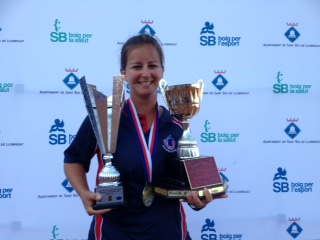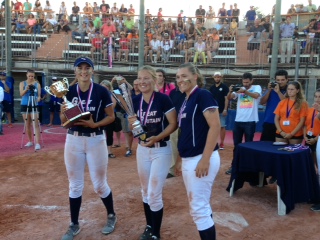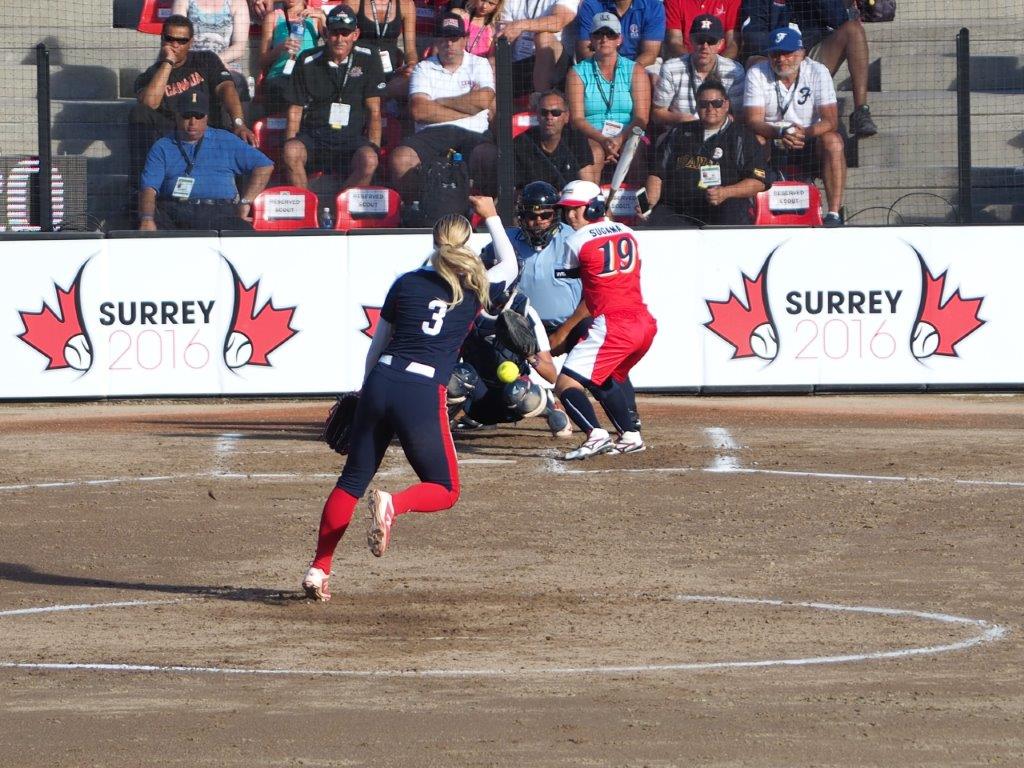
By Bob Fromer
.png) Surrey, British Columbia, Canada: 24 July – The United States has finally dethroned Japan at the top of world softball for the first time since 2010, winning the final here at the 15th Women’s World Championship on Sunday evening by a score of 7-3.
Surrey, British Columbia, Canada: 24 July – The United States has finally dethroned Japan at the top of world softball for the first time since 2010, winning the final here at the 15th Women’s World Championship on Sunday evening by a score of 7-3.
Earlier in the day, Japan had taken Team Canada apart 11-1 in four innings to advance to the final, leaving Canada with a bronze medal, their first since the 2010 World Championships in Venezuela.
In other results on Finals Day, Serbia defeated Ireland to top the group of teams that will be 25-31 in the final standings, the Czech Republic beat Austria in the final for the group that will be ranked 17-24, and Puerto Rico had a 4-1 victory over Australia behind the pitching of Megan King to lead the group that will be ranked 9-16.
For Australia, who finished 10th after winning the bronze medal in 2012 and 2014, it represents a big loss of pride for the Aussie Spirit, who may have stayed with an aging team a bit too long.
As for Great Britain, the team has finished 13th, three places higher than at the 2014 World Championships, but one place short of the team’s minimum goal of finishing inside the world’s Top 12.
Nevertheless, GB has finished higher than any of the 10 other European teams in the competition except the Netherlands, who came fourth, the best-ever placing achieved by a European team at a World Championship.
.jpg)
The final
The US won the final against Japan with power, as is their way, and the decisive blows were a pair of three-run home runs off Japanese starter Yukari Hamamura – one by right fielder Michelle Moultrie in the top of the first inning and the other by centre fielder Haylie McCleney in the top of the fourth.
Japan also had two home runs, hit by Haruna Sakamoto and Misato Kawano, but both were solo shots, and that was the difference in the game. Each team scored one additional run by means other than a home run.
The elephant in the room, however – or rather not in the room, or in the circle -- was legendary Japanese pitcher Yukiko Ueno, who beat the United States in the 2008 Olympic Final, the World Championship finals in 2012 and 2014 and on numerous other occasions in between, but was injured in a game prior to the recent World Cup of Softball in Oklahoma, and failed to recover in time to play here in Canada.

That left the bulk of the pitching for Japan with righthanders Yukari Hamamura and Yamato Fujita. Neither of them is Ueno, and while Fujita has been slightly the better pitcher throughout the tournament, she pitched Sunday morning’s win over Canada. So Hamamura started against the United States, and while she is certainly one of the world’s better pitchers, she doesn’t have quite enough to contain a line-up as powerful as that of Team USA, who are now drawing on players from the National Pro League as well as the cream of college softball.
By the time Fujita came in to relieve Hamamura in the top of the fourth inning, just after Haylie McCleney’s home run, Japan was trailing 7-1 and the game was up. While Fujita kept the US off the scoreboard the rest of the way (wriggling out of threats in the fourth, fifth and sixth innings), six runs was always going to be too much for Japan to make up against a very deep United States pitching staff.
And Team USA coach Ken Eriksen made full and creative use of that pitching depth, employing four pitchers over the course of the game to continually give the Japanese a different look, but also taking two of them out and later bringing them back to create the best possible match-ups.
Japan had eight hits to nine for the USA and both teams played errorless softball. But there’s nothing like the three-run homer for piling up runs.
No game involving Japan goes by without something amazing happening on defense, and there were two such plays in this game. In the top of the fifth inning, with US runners on first and second and no one out, US shortstop Delaney Spalding scorched a ball down the third baseline. But Yu Yamamoto, absolutely the best third base player in the world, somehow speared it cleanly, stepped on third and fired to first for a double play that broke the US rally.
In the top of the sixth inning, Japanese second base player Haruna Sakamoto snagged Aubree Munro’s hopper behind second base, heading towards centre field, but was still able to twist and throw Munro out.
Win or lose, it is always worth watching Team Japan.
This final however, and yesterday’s meeting between the two teams, which the US won 4-3, has gone some way to answering the question of whether Yukiko Ueno has been the difference between them over the past eight years. The answer appears to be that without Ueno, Japan can still beat anyone else in the world -- but maybe not the United States. Or at least not as often.

The pre-final
Earlier on Sunday, Japan and Canada had played to see who would advance to the final against the United States, and Canadian hopes were high.
But so much of softball is psychological. The Netherlands, for example, had a great run through this World Championship, playing confident, assured softball. But then they came up against Canada on Saturday night with a big prize at stake – a bronze medal and a chance to go to the World final – and suddenly their play was nervous and uncertain and they went down by 9-2 in five innings.
Today, it was Canada’s turn. Canada had lost only once in this tournament, and was looking like a dangerous offensive and defensive team, with a strong pitching duo in Sara Groenewegen and Lauren Regula. But against Japan, with a place in the final at stake, the Canadians simply wilted and the Japanese took them apart.
By the time a very short game was over, the Canadians had gone through four pitchers in four innings, the Japanese had hit four home runs, the Canadian defense had gifted the Japanese two infield errors along with some wild pitches and passed balls, and Japan coasted to an 11-1 mercy rule win in four innings.
The 2016 edition of Team Japan, minus their talisman pitcher Yukiko Ueno and with some of their former top players now retired or not selected, are not quite the force they were and are not necessarily 10 runs better than Canada.
But the Japanese do not countenance losing, and the Canadians perhaps had hoped rather than expected to win this afternoon’s game.
Japan scored three runs in the bottom of the first inning, two on a crushing home run by centre fielder Eri Yamada. They had a wobble in the top of the second when Canada scored and left the bases loaded, but then Japan scored three more runs in the second inning, another three in the third and two more in the fourth to bring up the 10-run margin and end the game.
Canadian pitchers simply could not cope with the Japanese hitters. Starter Sara Groenewegen tried her usual changes of pace, but lasted only two-thirds of an inning and was removed after walking the lead-off hitter and giving up Yamada’s home run, a single to Yu Yamamoto and a long double to Nozomi Nagasaki.
Sara Plourde came in to end the first inning, but gave up three more runs in the second – though only one of them was earned as the Canadian infield began to panic and committed two errors.
When Plourde walked Nozomi Nagasaki to start the Japanese third inning, then gave up a long double to Haruna Sakamoto (the Canadians executed a great relay to throw Nagasaki out at the plate), Lauren Regula came in from the bullpen. But Yuka Ichiguchi hit Regula’s second pitch over the wall in right-centre field and the next batter, shortstop Mana Atsumi, pulled a pitch over the right field wall for another home run.
After starting the game and getting the win against the Netherlands on Saturday night, Regula, who was out of the game for eight years before coming back for these World Championships, cried for joy. Her emotions today will have been a little different.
A fourth Canadian pitcher, Kyla Benz, started the bottom of the fourth inning, but she too got a rude welcome: Yu Yamamoto hit the first pitch she threw halfway up the large bleacher stands behind the right centre field fence.
Then a hit batter, a walk and finally a two-out double by Mana Atsumi ended the game and put the Canadians out of their misery.
The Bronze Medal will be some consolation for Canada, who have finished fourth behind Australia in the last two World Championships. But the manner in which they succumbed to a rampant Japan will be sobering.
Final standings
The final placings in the 2016 Women’s World Championship (which may not be quite the same as world rankings, which take other factors into account), are:
Gold – United States
Silver – Japan
Bronze – Canada
4 – Netherlands
5 – Mexico
6 – Venezuela
7 – China
8 – New Zealand
9 – Puerto Rico
10 – Australia
11 – Chinese Taipei
12 – Brazil
13 – Great Britain
14 – Italy
15 – Cuba
16 – Philippines
17 – Czech Republic
18 – Austria
19 – Greece
20 – Guatemala
21 – Peru
22 – Ecuador
23 – France
24 – Uganda
25 – Serbia
26 – Ireland
27 – Switzerland
28 – Kenya
29 – India
30 -- Israel
Meeting goals
At a brief ceremony held before the final, Greg Timm, the President of the Surrey 2016 Organising Committee, and the man who first conceived the idea of bringing the World Championship to this part of Canada, told the full house that “the theme these past 10 days, above all else, has been random acts of kindness. The community here in Surrey has shone bright this week.
“We set out to host the World Championships with two goals in mind,” Greg continued, “to inspire the youth in our community and to use the power of sport to bring people together in a troubled time. We feel we have accomplished both goals.”
Greg Timm also noted that this has been the largest-ever Women’s World Championship, the best-attended, and the largest team sporting competition ever held in Canada.
Debate will go on within the WBSC and elsewhere about the merits of large inclusive competitions as against small exclusive ones, but these World Championships have been a tremendous and engaging festival of sport, community and culture, and Greg Timm, the Surrey 2016 Committee, the 750 volunteers, the sponsors, and the federal, provincial and local governments that generously supported the event deserve all the plaudits they will now get.
And the weather, unusually for British Columbia, was stunning from virtually one end of the tournament to the other.
Tournament Notes
A few weeks ago, Team USA travelled to Japan for a short tour, and played a three-game series against the Japanese team. It wasn’t an official competition of any sort, just a few warm-up games for both teams before the World Championship.
The first game of the series, played in the Tokyo Dome, Japan’s major baseball stadium, drew over 31,000 spectators.
When the US played Japan here in Canada on Saturday, in a crucial match near the end of a World Championship on the main field at Softball City, Canada’s premier softball complex, there were plenty of empty seats, and the crowd may have numbered a couple of thousand at best. Later that evening, when the host team Canada was playing against the Netherlands in a game that would take them a step closer to a World Championship final, the crowd was recorded as 3,250, and that was probably close to the attendance at Sunday’s final, when virtually every seat and standing place at the main field was taken.
Whether a bigger venue would have produced a bigger attendance is something that no one can know, but the discrepancy between the interest in softball in Japan and in Canada is still striking.
Even in the United States, final games at the College World Series draw around 5,000 fans, and National Pro League teams are thrilled if they attract more than 1,000 people to a game.
There is a barrier here that needs to be broken. It undoubtedly arises in part because of the societal and media bias against women’s sports, even in a country as liberal as Canada. And though Canada is a big softball country in world terms, the game is still a minority sport here when compared with ice hockey, Canadian football, baseball, basketball and soccer, which all have professional teams and leagues.
There has been local media coverage of this event in the city of Surrey where the competition is being held, an hour or so away from Vancouver, but coverage in the national Canadian media has been sparse, consisting mainly of stories about the two Cuban players who disappeared on reaching the country. And this despite a well-organised media team put together by the Surrey 2016 organisation, with its many capable and eager volunteers.
One thing that would certainly help would be television coverage as opposed to webstreaming. The webstreaming here of games from the main stadium has been excellent and professional, but webstreaming reaches a niche audience prepared to pay $19.99 to watch it over a 10-day period, whereas television, even on a pay channel, reaches a wide general audience.
The NCAA, the governing body for US collegiate sports, has had extensive coverage for years on ESPN for its College World Series (you could even see a lot of CWS games in the UK this year), but softball’s world governing body has never managed this for its premier international event, and even Olympic softball, in the past, has had little airtime except in the participating countries. Some games were shown on the BBC in 2008 through red button coverage but you really had to work hard to find them.
Softball and baseball may now be technically regarded as women’s and men’s disciplines of the same sport from an Olympic point of view, but baseball still has most of the profile and the money.
Except, perhaps, in Japan, where over 31,000 people turned out to see the two best softball teams in the world.
.jpg)
A final word on the GB Women’s Team
As noted in previous reports, the GB Team played well in virtually every game except perhaps against New Zealand, had real chances to beat Japan, Chinese Taipei and Brazil and was close to Canada. The failure to give up many runs against these “big” teams is what got GB as high as 13th in the final standings. But GB’s only wins came by the expected wide margins against two weak teams, Uganda and Ireland.
The main problem was lack of offense – or perhaps more critically, a lack of runs, since GB had more hits than their opponents in the games they lost to Japan, Chinese Taipei and Brazil. GB’s overall team batting average was a respectable .270, but that was distorted by the big wins against Uganda and Ireland; in the other five games it was only .181. And GB batters did not draw many walks, so the team’s on-base percentage, even including the Uganda and Ireland games, was only .302. And runners on base are crucial if you want to score runs.
The defense was decent: there were only eight errors and four unearned runs allowed in seven games. And the GB pitchers – Georgina Corrick, Carling Hare and Kori Waugh -- produced a respectable combined Earned Run Average of 2.46, especially considering some of the teams GB played (and look what Japan did to Canada’s pitchers on Sunday).
It’s possible that the GB Team was slightly less than the sum of its parts, and that was the difference between close losses and close wins. This may be because, unlike almost all other teams at this tournament, our players do not get to train and play together except at and just before major championships, and the bonding necessary to build a really tight and committed unit, on and off the field, doesn’t get to happen.
The only answer to this is funding that will allow a group of disparate players to come together more often and grow as a team. Whether the expected inclusion of softball in the 2020 OIympics will bring the chance of external funding for the GB Softball programme remains to be seen.
.jpg)
PAGE PLAYOFF RESULTS
Here are the final results of the four Page Playoff rounds:
CHAMPIONSHIP DOUBLE PAGE PLAYOFF
Netherlands 8, New Zealand 2
Canada 4, China 3 (China finishes 7th)
Japan 2, Mexico 0
USA 7, Venezuela 0 (5 inns)
Netherlands 8, Venezuela 1
Canada 5, Mexico 0
USA 4, Japan 3
Canada 9, Netherlands 2 (5 inns)
Japan 11, Canada 1 (4 inns)
Final:
USA 7, Japan 3
CHAMPIONSHIP SINGLE PAGE PLAYOFF
Quarter-finals:
Chinese Taipei 4, Cuba 1
Australia 1, Italy 0
Brazil 1, GB 0
Puerto Rico 2, Philippines 0
Semi-finals:
Australia 1, Chinese Taipei 0
Puerto Rico 9, Brazil 2
Final:
Puerto Rico 4, Australia 1
PLACEMENT DOUBLE PAGE PLAYOFF
Guatemala 5, France 2 (9 inns)
Greece 4, Uganda 0
Austria 13, Ecuador 0 (5 inns)
Czech Republic 14, Peru 3 (4 inns)
Guatemala 12, Ecuador 1 (4 inns)
Greece 4, Peru 0
Czech Republic 12, Austria 3 (5 inns)
Greece 2, Guatemala 1
Austria 1, Greece 0
Final:
Czech Republic 5, Austria 0
PLACEMENT SINGLE PAGE PLAYOFF
Quarter-finals:
Switzerland 5, India 1
Kenya 7, Pakistan 0 (Forfeit)
(Serbia gets a bye to the semi-finals)
Ireland 7, Israel 6
Semi-finals:
Serbia 7, Switzerland 6
Ireland 11, Kenya 3 (5 inns)
Final:
Serbia 8, Ireland 5
Photos by Simon Mortimer
